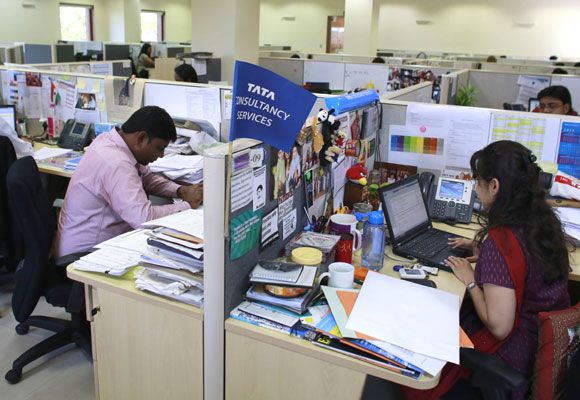 In 2013-14, Rs 1.2 lakh crore (Rs 1.2 trillion) was spent on salary & wages by IT companies, compared with Rs 1.06 lakh crore (Rs 1.06 trillion) by financial services firms
In 2013-14, Rs 1.2 lakh crore (Rs 1.2 trillion) was spent on salary & wages by IT companies, compared with Rs 1.06 lakh crore (Rs 1.06 trillion) by financial services firms
The information technology (IT) sector has overtaken financial services companies in payouts as salaries and wages for white-collar jobs in India and is now closing in on the manufacturing sector.
In 2013-14, IT firms on the BSE 500 index accounted for nearly a quarter (24 per cent) of India Inc’s total salary bill, against the banking and financial sector’s share of 21 per cent.
Though manufacturing companies still lead the charts, accounting for a third of the total bill, their salary expenditure is growing at a much slower pace. I
n the past five years, IT companies’ spend on salary & wages has increased at a compound annual growth rate (CAGR) of 18.6 per cent, compared with 12.5 per cent for manufacturing sector companies and 16.4 per cent for financial ones.
Going by the current pace, IT firms are likely to exceed the manufacturing sector in salary payouts over the next five years.
In 2013-14, the IT firms in our sample of BSE-500 companies spent nearly Rs 1.2 lakh crore on salaries & wages, against Rs 1.06 lakh crore the banking and financial services ones spent.
Manufacturing companies were at the top with a salary payout of Rs 1.65 lakh crore (Rs 1.65 trillion).
The Business Standard analysis of the 420 BSE-500 companies whose financials are available for the past 20 years is based on employee cost, which has been taken as a proxy for job growth in the absence of comparable data on headcount for companies.
In 2013-14, Tata Consultancy Services’ salary bill, at Rs 29,860 crore (Rs 298.60 billion), was higher than SBI’s Rs 22,504 crore (Rs 225.04 billion)and Coal India’s Rs 27,769.4 crore (Rs 277.69 billion).
At the end of March this year, TCS’ global headcount exceeded 300,000, compared with State Bank of India’s 222,000 (on a standalone basis; comes to around 290,000 if non-banking subsidiaries and associates are included).
TCS’ employee strength, however, is growing at 10-12 per cent, while SBI’s is growing at a near-flat to negative rate.
“Over the past 10 years, the bulk of the incremental job creation has taken place in the services sector, especially the IT industry.
Other sectors have failed to catch up with the IT industry’s pace, resulting in a faster rate of growth in salaries & wages for the leading IT companies,” says Sachin Vohra, director (recruitment services), IKYA Human Capital Solution.
These facts might not be surprising, as IT services are labour-intensive, with an employee earning Rs 45 for every Rs 100 worth of revenue earned by his or her employer.
The corresponding ratio is 9.2 for banking & financial companies, 7.8 for manufacturing ones (excluding pharma), 13.2 for pharma companies, 10 for telcos, 5.3 for other services (excluding telecom and IT) and 8.9 for construction & infrastructure firms.
The rise of new sectors has completely transformed the job market in the past 10 years. Emerging ones like IT, pharma, telecom, automobiles and construction & infra now account for 40 per cent of India Inc’s total salary bill, against 20 per cent in 2003-04.
Incremental growth in manufacturing jobs is now led by automakers and pharma companies, with their salary bill increasing at CAGR of 22 per cent and 20 per cent, respectively, since 2008-09.
Tata Motors accounts for the bulk of growth in auto sector, as its salary bill has tripled in the past five years on the back of rapid growth of its British subsidiary, Jaguar-Land Rover.
Excluding Tata Motors, growth in the auto sector’s salary bill was modest at 16.9 per cent.
In pharma, job growth is being led by those like Sun Pharma, Dr Reddy’s and Lupin, which are growing through acquisitions in the developed markets where salary levels are much higher than in India.
The other segments in the manufacturing sector have lagged behind in job creation.
The salary bill in manufacturing (excluding automobile and pharma) grew at CAGR of 9.9 per cent in the past five years.
Overall, the services sector has been leading the job market with 15.9 per cent CAGR growth in salary bill, excluding IT. A large part of the services sector is unorganised and not captured in the corporate numbers.
The salary bill for IT companies has grown despite real wages (adjusted for inflation) for entry-level employees at their lowest in nearly a decade.
Most IT firms have not revised their joining salaries for some years now.
Companies’ bargaining power has improved due to a significant jump in supply of engineering students and a subdued hiring in competing industries.
Capacity at engineering colleges has been increasing at CAGR of over 20 per cent.
According to Rituparna Chakraborty, senior vice-president & co-founder, TeamLease Services, with 12 million young people joining the workforce every year, the services sector alone cannot deliver.
“Agriculture, infrastructure and pharma need to step up, besides the real engineering and automotive sectors. Entrepreneurship also needs a fillip to generate jobs,” Chakraborty said.








